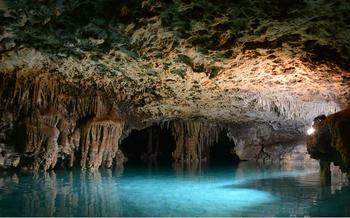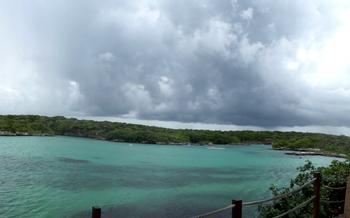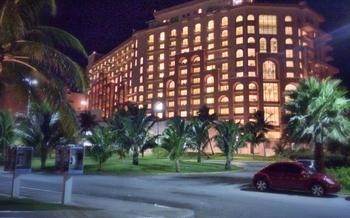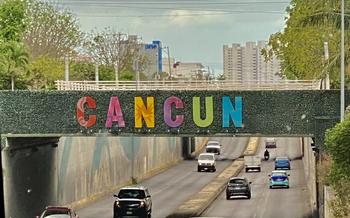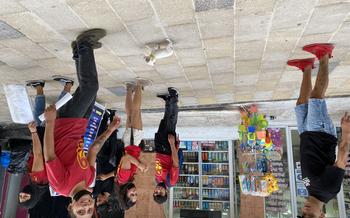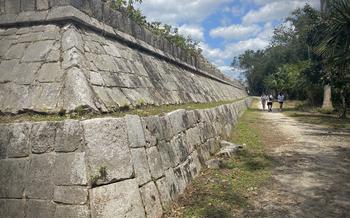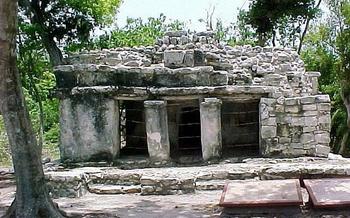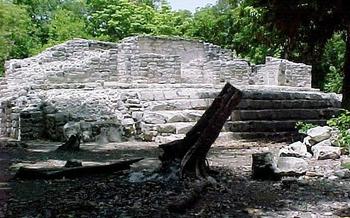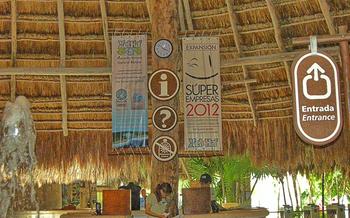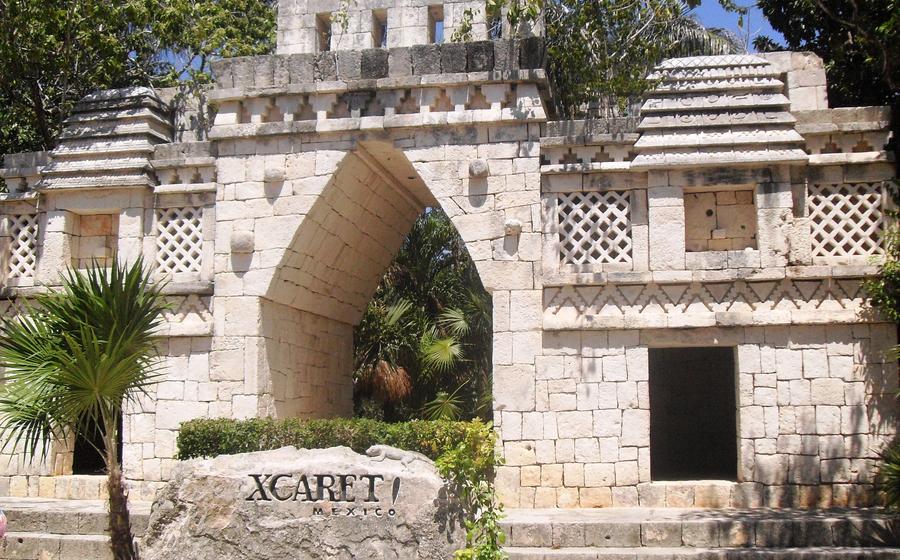
The Mayan Cacao Company, Playa del Carmen
- History of the Mayan Cacao Company
- Location and Access
- Visiting Hours and Ticket Prices
- Guided Tours
- The Cacao Plantation
- The Chocolate Factory
- Interactive Workshops
- Cacao Museum
- Tasting Room
- Gift Shop
- Restaurant and Cafe
- Sustainability and Environmental Practices
- Community Involvement
- Cultural Significance
- Insider Tip
History of the Mayan Cacao Company
The Mayan Cacao Company was founded in 1993 by a group of Mayan farmers with the goal of preserving the traditional Mayan way of life and promoting sustainable agriculture. The company began with a small plantation of cacao trees and a humble chocolate factory, but has since grown into a successful business that produces high-quality chocolate while also supporting local communities and preserving Mayan traditions. Today, the Mayan Cacao Company is a leading producer of organic, fair-trade chocolate in the world and is committed to promoting sustainable farming practices and supporting local communities.
Location and Access
The Mayan Cacao Company is strategically located in the heart of the Riviera Maya, just a short drive from the popular tourist destinations of Playa del Carmen and Cancun. Its exact address is Carretera Chemax-Puerto Juarez, Km 285, 77712 Leona Vicario, Q.R., Mexico.
To get to the Mayan Cacao Company, visitors can either drive or take a taxi. For those driving, the journey from Playa del Carmen takes approximately 45 minutes, while from Cancun, it takes about an hour and 15 minutes. Ample parking space is available on-site, ensuring a hassle-free visit for those arriving by car.
Visiting Hours and Ticket Prices
The Mayan Cacao Company is open every day of the week, including holidays. The hours of operation are from 9:00 AM to 5:00 PM. However, it's always a good idea to check their website or call ahead to confirm these hours, as they may be subject to change without notice.
The company offers different ticket options to suit your budget and preferences. The regular admission ticket, which includes a guided tour of the plantation and the factory, costs $20 USD for adults and $15 USD for children. If you prefer to explore at your own pace, a self-guided tour ticket is available for $15 USD for adults and $10 USD for children.
The Mayan Cacao Company also offers a variety of discounts and special promotions throughout the year. For example, they offer a 10% discount for groups of 10 or more people. They also have a 25% discount for students with a valid ID. To take advantage of these discounts, simply mention them when purchasing your tickets.
Guided Tours
The Mayan Cacao Company offers guided tours that provide visitors with an in-depth look into the world of cacao and chocolate. These tours are led by knowledgeable and passionate guides who share their expertise on the history, cultivation, and production of cacao.
Guided tours are available in several languages, including English, Spanish, and French. They typically last for around 60 to 90 minutes and cover the entire cacao journey, from the plantation to the chocolate factory. During the tour, visitors will learn about the different types of cacao trees, the harvesting process, and the traditional methods used to make chocolate.
The cost of a guided tour is generally included in the regular ticket price. However, it is advisable to book your tour in advance, especially during peak season, to avoid disappointment. Private tours are also available upon request, at an additional cost.
The Cacao Plantation
The Mayan Cacao Company boasts a sprawling 100-acre cacao plantation, located just a short walk from the main facility. This plantation is a testament to the company's commitment to sustainability and self-sufficiency. Here, visitors can immerse themselves in the world of cacao farming and witness the entire process, from tree to bean.
The plantation is home to a diverse range of cacao trees, including the prized Criollo variety, known for its rich flavor and aroma. Visitors can learn about the different stages of cacao growth, from the delicate white flowers to the ripening pods. The knowledgeable guides will explain the intricate process of harvesting, which involves carefully selecting and cutting the ripe pods without damaging the tree.
The plantation also features a dedicated area for drying and fermenting the cacao beans. This crucial step in the chocolate-making process helps to develop the beans' unique flavor profile. Visitors can observe the beans as they undergo transformation, from their initial fresh state to the rich, dark color that signifies readiness for roasting.
The Chocolate Factory
The Mayan Cacao Company boasts a state-of-the-art chocolate factory that offers visitors a glimpse into the intricate process of transforming cacao beans into delectable chocolate. The factory is equipped with the latest machinery and technology, ensuring the highest standards of quality and efficiency.
Visitors can observe the entire chocolate-making process, from the sorting and roasting of the cacao beans to the grinding, conching, and tempering stages. Expert chocolatiers guide visitors through each step, explaining the science and artistry behind chocolate production.
The factory produces a wide range of chocolate products, including dark chocolate, milk chocolate, white chocolate, and specialty chocolates infused with unique flavors and ingredients. Visitors can sample the various types of chocolate and learn about the different factors that influence their taste and texture.
Interactive Workshops
The Mayan Cacao Company offers a range of interactive workshops that provide visitors with a hands-on experience in the art of chocolate making. These workshops are led by experienced chocolatiers who guide participants through the process of transforming cacao beans into delicious chocolate.
There are several types of workshops to choose from, each with its own unique focus. The Chocolate-Making Workshop teaches participants how to roast, grind, and temper chocolate, as well as how to create their own custom chocolate bars. The Chocolate Truffle Workshop focuses on the art of making truffles, while the Chocolate Painting Workshop allows participants to create their own edible masterpieces using chocolate.
Workshops typically last for around two hours and cost between $30 and $40 per person. They are suitable for people of all ages and skill levels, making them a great option for families, couples, or groups of friends.
During the workshops, participants will learn about the history of chocolate, the different types of cacao beans, and the process of chocolate making. They will also have the opportunity to ask questions and get expert advice from the chocolatiers.
By the end of the workshop, participants will have created their own delicious chocolate creations to take home and enjoy. They will also have a better understanding of the complex process of chocolate making and the important role that cacao plays in Mexican culture.
Cacao Museum
The Mayan Cacao Company houses an informative and engaging Cacao Museum that delves into the rich history and cultural significance of cacao. Through a series of interactive exhibits, visitors can learn about the ancient Mayan civilization's relationship with cacao, its cultivation and harvesting practices, and its role in their religious ceremonies and daily life.
The museum showcases a collection of traditional cacao farming tools and equipment, providing insights into the methods used by Mayan farmers centuries ago. Visitors can also explore interactive displays that demonstrate the process of chocolate making, from the harvesting of cacao pods to the roasting, grinding, and conching of the beans.
The museum offers a sensory experience, allowing visitors to smell and taste different varieties of cacao beans and chocolate. The museum also highlights the cultural significance of cacao in modern-day Mexico, showcasing its use in traditional dishes, beverages, and desserts.
Tasting Room
The Mayan Cacao Company's tasting room provides a unique opportunity to sample various chocolate products, from traditional Mayan recipes to modern-day creations. Visitors can indulge in a range of flavors, including dark, milk, and white chocolate, each with its distinct aroma and taste profile.
The tasting room also offers visitors the chance to pair chocolate with other flavors, such as fruits, nuts, and spices. This allows them to explore new flavor combinations and discover their personal preferences. The knowledgeable staff is always on hand to provide guidance and recommendations, ensuring that each guest has a truly memorable experience.
Whether you are a chocolate aficionado or simply looking to satisfy your sweet tooth, the Mayan Cacao Company's tasting room is a must-visit. It is a place where you can learn about the history and culture of chocolate while indulging in a delicious and unique tasting experience.
Gift Shop
The Mayan Cacao Company gift shop is a treasure trove of chocolatey delights and unique souvenirs. From dark chocolate bars with 70% cacao to sweet milk chocolate truffles, there's something to satisfy every chocolate lover's craving. The shop also offers a variety of cacao-based products, such as cacao nibs, cacao powder, and cacao butter, which are perfect for home cooks and bakers who want to experiment with chocolate recipes.
In addition to chocolate, the gift shop sells a variety of handcrafted souvenirs inspired by Mayan culture, including textiles, ceramics, and jewelry. These items are all made by local artisans, so you can be sure that you're getting a unique and authentic souvenir.
Prices in the gift shop are reasonable, and a variety of payment methods are accepted, including cash, credit cards, and mobile payments. The friendly and helpful staff is always on hand to assist you with your purchases and answer any questions you may have.
Restaurant and Cafe
At the heart of the Mayan Cacao Company, visitors can indulge in a delightful culinary journey at the on-site restaurant and cafe. The menu showcases a tantalizing array of dishes, each infused with the rich flavors of cacao. From savory dishes that harmonize cacao with regional ingredients to decadent desserts that celebrate the versatility of chocolate, the culinary creations pay homage to the Mayan heritage while catering to contemporary palates.
Nestled amidst lush greenery, the restaurant offers a tranquil ambiance for diners to savor their meals. Alfresco seating invites guests to bask in the warm Mexican sun while enjoying the sights and sounds of the surrounding plantation. The cafe, on the other hand, provides a cozy and inviting atmosphere, perfect for sipping on a cup of freshly brewed coffee or indulging in a sweet treat.
Prices at the restaurant and cafe are reasonable, with dishes ranging from 100 to 300 pesos. The friendly and attentive staff ensures that every diner has a memorable and enjoyable experience. Whether it's a hearty breakfast to kick off the day or a leisurely lunch break amidst the cacao groves, the Mayan Cacao Company's restaurant and cafe offer a culinary adventure that blends tradition with innovation.
Sustainability and Environmental Practices
The Mayan Cacao Company is committed to sustainable and environmentally friendly practices. It recognizes the importance of preserving the natural environment and protecting the local ecosystem. The company has implemented several initiatives to reduce its environmental impact, including:
-
Waste Reduction: The company has implemented a comprehensive waste management program to minimize waste generation. It recycles and composts organic waste, and collaborates with local organizations to responsibly dispose of non-recyclable materials.
-
Water Conservation: The company has invested in water-saving technologies and practices to reduce its water consumption. It uses drip irrigation systems in the cacao plantation to conserve water and prevent soil erosion.
-
Renewable Energy: The company generates a significant portion of its energy needs through renewable sources, such as solar panels installed on the factory rooftop. It also encourages employees to use public transportation or carpool to reduce carbon emissions.
-
Organic Farming: The company promotes sustainable farming practices by using organic methods in its cacao plantation. It avoids the use of chemical pesticides and fertilizers, preserving the natural biodiversity and soil health.
-
Educational Programs: The company conducts educational programs to raise awareness about sustainable farming practices and environmental conservation. It offers workshops and seminars to local communities, schools, and visitors, promoting responsible stewardship of the natural environment.
Community Involvement
The Mayan Cacao Company actively engages in social responsibility initiatives, demonstrating its commitment to supporting local communities and promoting sustainability. The company believes that a thriving community is essential for the long-term success of its business. Here are some examples of their community involvement efforts:
-
Education and Training Programs: The Mayan Cacao Company provides educational opportunities to local communities, offering training on sustainable farming practices, chocolate production, and business management. These programs empower individuals with the skills they need to improve their livelihoods and contribute to the local economy.
-
Fair Trade Practices: The company adheres to fair trade principles, ensuring that farmers receive fair prices for their cacao beans. This practice supports the local economy and encourages sustainable farming practices by providing farmers with a stable income.
-
Support for Local Projects: The Mayan Cacao Company actively supports community projects that benefit local residents, such as building schools, providing medical supplies, and sponsoring cultural events. These initiatives demonstrate the company's commitment to improving the quality of life in the surrounding communities.
By actively engaging in community involvement initiatives, the Mayan Cacao Company creates a positive impact beyond its business operations. The company recognizes that its success is intertwined with the well-being of the local communities and works to foster sustainable development and economic growth in the region.
Cultural Significance
Cacao holds a deep cultural significance in Mexico, deeply entwined with the history and traditions of the Mayan civilization. For the Mayans, cacao was more than just a food source; it was a sacred gift from the gods, revered for its medicinal and spiritual properties. Cacao beans were used as currency, offerings in religious ceremonies, and as a symbol of wealth and status.
The Mayans believed that cacao was a gift from the gods, and they used it in many different ways. They drank it as a beverage, used it as a currency, and even used it to make offerings to their gods. Cacao was also used in traditional Mayan medicine, and it was believed to have many healing properties.
Today, cacao continues to play an important role in Mexican culture. It is used in a variety of traditional dishes, such as mole poblano and champurrado. Cacao is also a popular ingredient in Mexican chocolate, which is known for its rich and complex flavor.
Insider Tip
To fully immerse yourself in the Mayan Cacao Company experience, plan your visit during the off-season (typically from May to October) to avoid the crowds and enjoy a more personalized experience. Combine your visit with other nearby attractions, such as the Xcaret Eco Theme Park, Xel-Há water park, or the Gran Cenote, to make a day of it. When exploring the chocolate factory, don't hesitate to ask questions and engage with the knowledgeable staff who are passionate about sharing their expertise. To make the most of your visit, take advantage of the guided tours, participate in the interactive workshops, and indulge in the cacao-inspired culinary delights at the restaurant and cafe. Remember to bring a camera to capture the beautiful scenery and your chocolate-making adventures.
